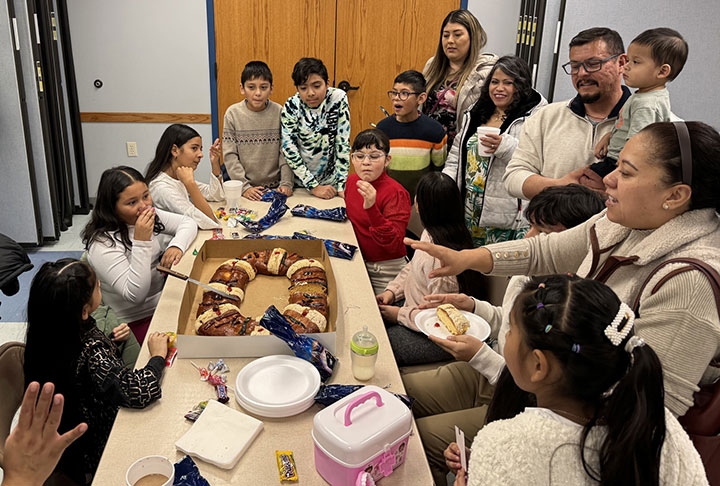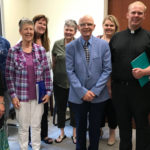
St. Mary of the Visitation-Ottumwa’s Spanish Children’s Choir celebrates a job well done at Mass with rosca (three kings bread) and goodie bags earlier this month at the parish.
By Marti Jewell and Dan Ebener
The Catholic Messenger
We are a multicultural Church, rich in our diversity. This reality, ripe with opportunity and filled with challenge, is not yet fully recognized nor appreciated by the U.S. Catholic Church. This is the premier finding of the 2022-23 study of vitality and parish diversity that we conducted on behalf of the Catholic Leadership Institute (CLI) and the Conference for Pastoral Planning and Council Development (CPPCD).
We held 40 Zoom interviews with Catholic pastors, 40 focus groups with their parish staff and 40 focus groups with their parishioners. Our study included 8 parishes that were primarily African American, 19 that were mostly Hispanic, 5 with a significant Vietnamese membership and 10 parishes that were less diverse. Our findings reflect the phrase used by the U.S. Conference of Catholic Bishops (USCCB): “One Church, Many Cultures.”
Over the next few months, we will share with The Catholic Messenger the story of parish life as we encountered it in our interviews with these parishes. It is a changing and challenging story. We heard what previous parish studies revealed, i.e., parishioners want a solid Sunday experience, good pastors, active formation programs and an opportunity to serve others. People want to know Christ in a personal relationship and to be able to share that relationship. They want a parish community that cares about them. This is true across cultures and aligns with previous studies of parish vitality.
However, we also found that while parishioners, no matter their culture, have these same desires for their parish, meeting these desires differs from culture to culture. We believe our study offers a glimpse into the current reality in the U.S. Catholic Church and provides suggestions for pastoral leaders. The results describe unique cultural differences and explain some of the changing narrative about the reality of Catholic parish life.
Serving a diverse Church is both difficult and complex. We witnessed the deep challenges to pastors, staff and parishioners of becoming intercultural parishes. Language and cultural divisions between diverse groups serve as a barrier to fully involving everyone in the life of the parish. What we heard supported the call for adapting intercultural competences.
While our study focuses primarily on the multicultural nature of parish life, we heard the significant adaptive challenges that all parishes are facing. For example, today’s parishes are impacted by the growth of the “Nones” — the youths and young adults no longer coming to church, the polarity caused by today’s political turmoil, a changing workforce, and the further secularization of society.
Perhaps the greatest contribution of our research is the richness of the vast diversity we encountered. We came to realize how the face of the U.S. Church has changed but our mindset has not. We are no longer a Euro-American church with immigrants coming to “our” parishes. Rather, we have become a Church of many cultures, the diverse body of Christ. In the term the USCCB uses, we are interculturating. In other words, our very diversity is enriching parish life.
(Dan Ebener is a leadership professor for the Master of Organizational Leadership (MOL) program at St. Ambrose University in Davenport and director of Parish Planning for the Diocese of Davenport. Marti Jewell, associate professor emerita, is a professor, author and researcher of pastoral leadership.)











